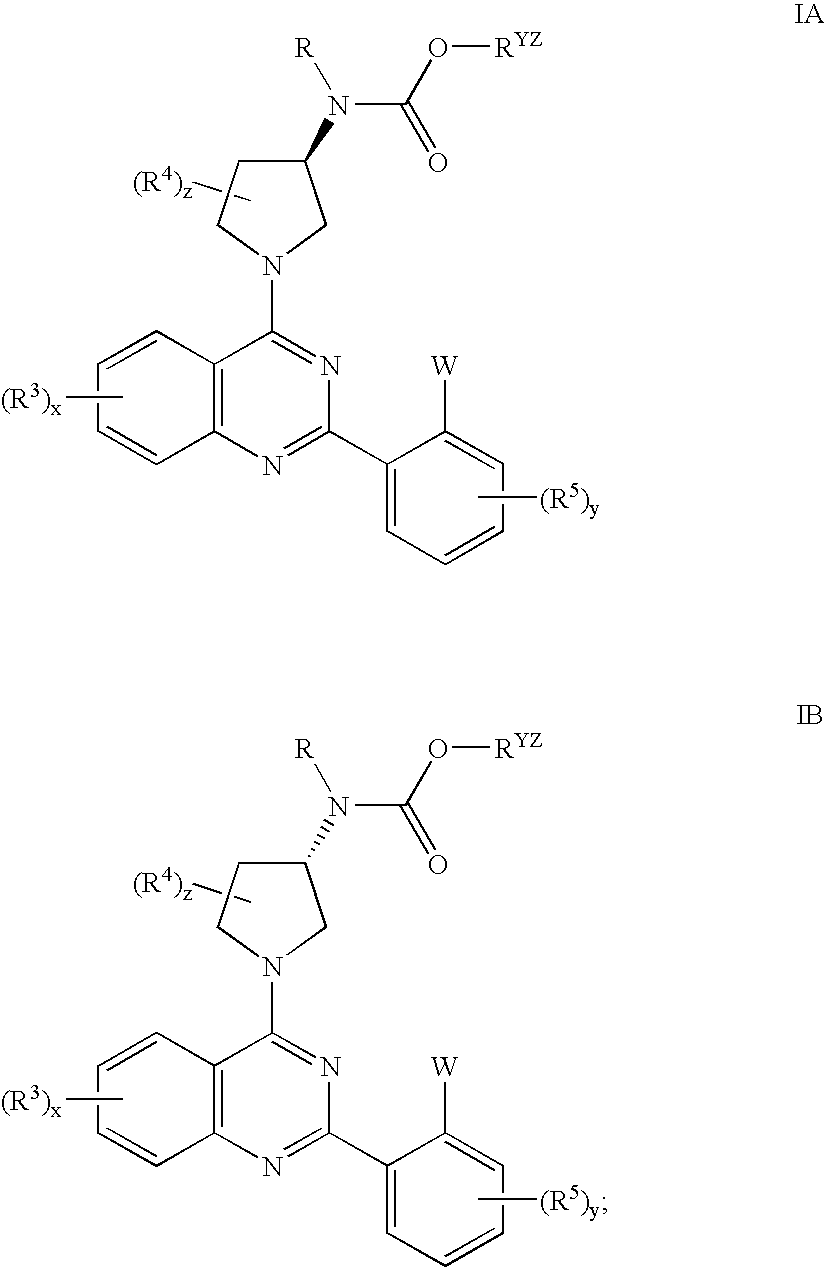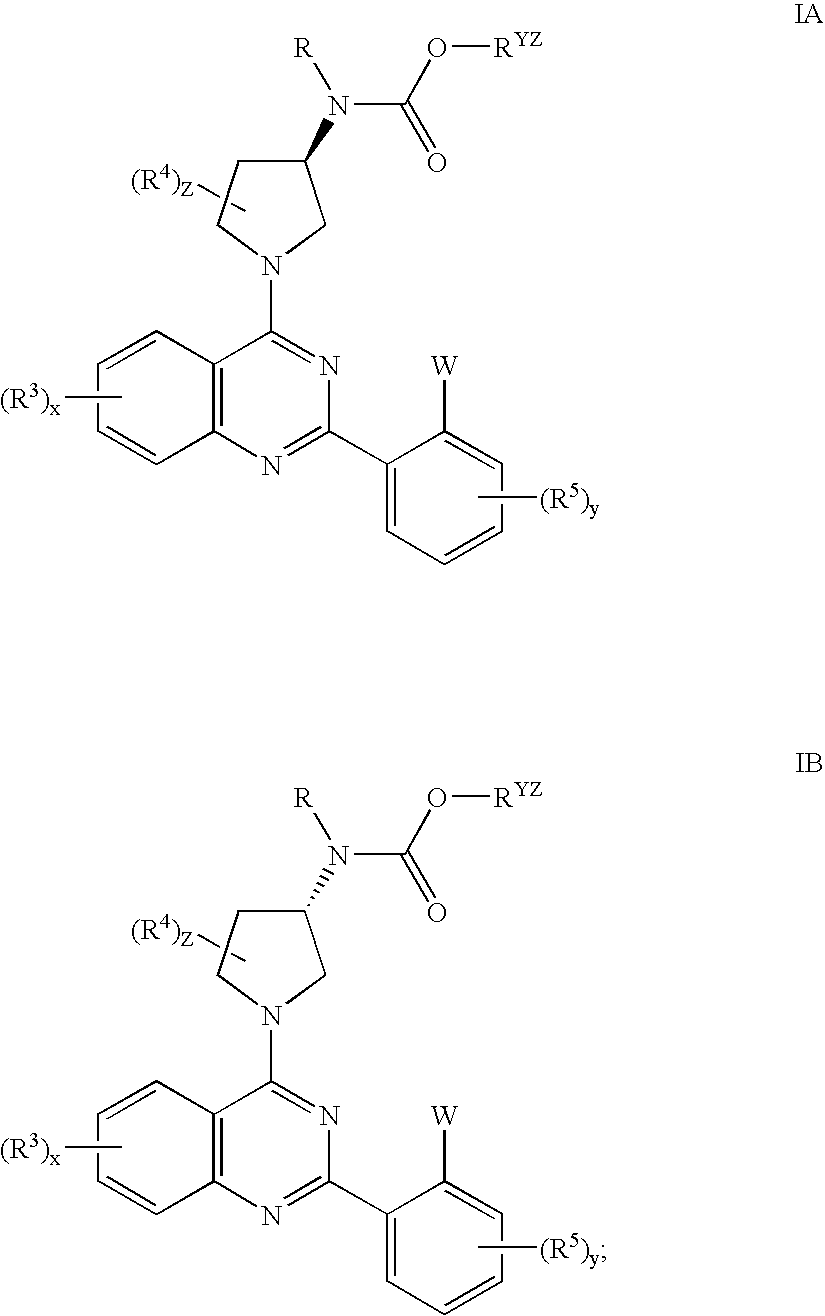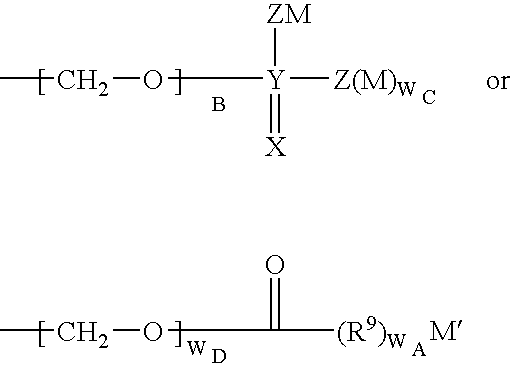Quinazolines useful as modulators of voltage gated ion channels
a technology of voltage gated ion channels and quinazolines, which is applied in the field of compounding, can solve the problems of life-threatening cardiac arrhythmias and cardiac failure, lack of selectivity of na channel blockers currently in the market, and limited effectiveness of sodium channel blockers and calcium channel blockers for the disease states described abov
- Summary
- Abstract
- Description
- Claims
- Application Information
AI Technical Summary
Benefits of technology
Problems solved by technology
Method used
Image
Examples
example 1
(R)-2-Methoxyethyl 1-(2-(2-fluoro-6-hydroxyphenyl)-7-methylquinazolin-4-yl)pyrrolidin-3-ylcarbamate (compound 1)
[0313]
N-(2-Cyano-5-methyl-phenyl)-2-fluoro-6-methoxy-benzamide
[0314]
[0315]6-Fluoro-2-anisoic acid (110 g, 0.70 mol) was added in portions over 15 minutes to a mixture of thionyl chloride (230 ml, 3.2 mol), toluene (200 mL), and DMF (1 mL). The resulting mixture was stirred overnight at room temperature. The solution was evaporated to dryness and added dropwise to an ice-bath cooled solution of 2-amino-4-methylbenzonitrile (92.5 g, 0.70 mol) in pyridine (200 mL). The dropping funnel was rinsed with a minimal amount of acetonitrile. The resulting mixture was stirred overnight at room temperature under a nitrogen atmosphere and was subsequently poured into 2 L ice water. The resulting slurry was stirred vigorously for 1 hour. The formed solid was collected by filtration and was washed twice with water. The filter cake was dissolved in 2 L dichloromethane, and this solution wa...
example 2
(S)-{1-[2-(2-Hydroxy-phenyl)-7-methyl-quinazolin-4-yl]-pyrrolidin-3-yl}-carbamic acid tert-butyl ester
[0331]
N-(2-Cyano-5-methyl-phenyl)-2-methoxy-benzamide
[0332]
[0333]To a stirred solution of 4-methyl-2-aminobenzonitrile (100 g, 0.75 mol) in 800 mL CH2Cl2 was added triethylamine (77.4 g, 0.76 mol) and dimethylaminopyridine (4.62 g, 0.037 mol). The solution was cooled to 0-5° C., and o-anisoyl chloride (129 g, 0.75 mol) was added over 1 h while maintaining the reaction temperature at 0-5° C. The reaction was then stirred at 30-40° C. for 3 h. Water (400 mL) was added, and the mixture was stirred for 15 minutes. The organic layer was separated, and the aqueous solution was extracted with CH2Cl2 (600 mL). The combined organic layers were dried over sodium sulfate, filtered, and concentrated in vacuo to yield a solid residue, to which 800 mL hexane were added. The slurry was stirred and filtered to give N-(2-cyano-5-methyl-phenyl)-2-methoxy-benzamide as a yellow powder (180 g, 90%). mp ...
example 3
(R)-Ethyl 1-(2-(2-hydroxyphenyl)-7-methylquinazolin-4-yl)pyrrolidin-3-ylcarbamate (compound 2)
[0342]
tert-Butyl (R)-1-(2-(2-hydroxyphenyl)-7-methylquinazolin-4-yl)pyrrolidin-3-ylcarbamate
[0343]
[0344]To a cooled (0-5° C.) solution of (3R)-(+)-3-Boc-aminopyrrolidine (12.0 g, 65 mmol) and triethylamine (19 mL, 129 mmol) in DMF (100 mL) was added a solution of 2-(4-chloro-7-methylquinazolin-2-yl)phenol (17.4 g, 64 mmol) in CH2Cl2 (500 mL) and DMF (100 mL). After stirring the mixture for 5 hours at room temperature, water (900 mL) was added. The aqueous layer was extracted with dichloromethane (3×300 mL), and the combined organic layers were washed with saturated aqueous NaCl solution (300 mL), dried over sodium sulfate, filtered, and evaporated to dryness under reduced pressure. The yellow residue (21 g) was treated with 100 mL methanol at room temperature. The solid was collected by filtration and was washed with methanol to yield tert-butyl (R)-1-(2-(2-hydroxyphenyl)-7-methylquinazolin...
PUM
| Property | Measurement | Unit |
|---|---|---|
| temperature | aaaaa | aaaaa |
| temperature | aaaaa | aaaaa |
| flow rate | aaaaa | aaaaa |
Abstract
Description
Claims
Application Information
 Login to View More
Login to View More - R&D
- Intellectual Property
- Life Sciences
- Materials
- Tech Scout
- Unparalleled Data Quality
- Higher Quality Content
- 60% Fewer Hallucinations
Browse by: Latest US Patents, China's latest patents, Technical Efficacy Thesaurus, Application Domain, Technology Topic, Popular Technical Reports.
© 2025 PatSnap. All rights reserved.Legal|Privacy policy|Modern Slavery Act Transparency Statement|Sitemap|About US| Contact US: help@patsnap.com



